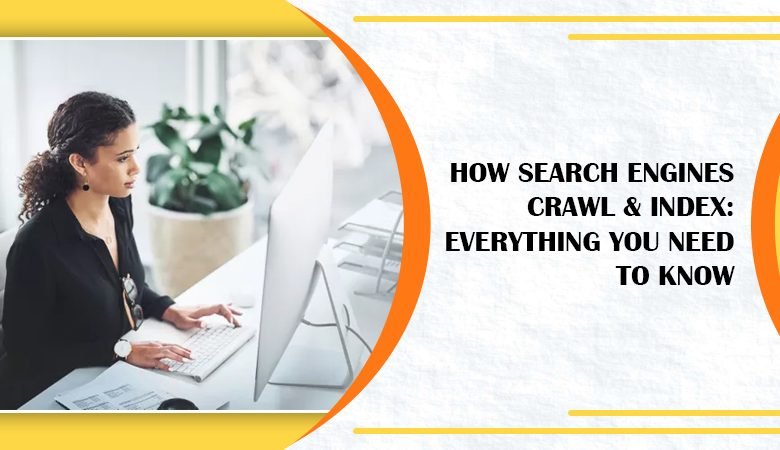HOW SEARCH ENGINES CRAWL AND INDEX: EVERYTHING YOU NEED TO KNOW
Search Engine CRAWLING, INDEXING AND RANKING

Search engines crawl the web to store and index pages in a database. With the assistance of SEO services, crawling and indexing can become simplified for search engines like Google.
WHAT IS A SEARCH ENGINE?
Search engines are like gateways to the world wide web. These are portals through which people can discover information and products/services. Search engines operate via search terms or keywords that people enter to find related results. However, not all pages are shown on the result page. Only those results crawled, indexed, and ranked by an SEO specialist will appear in the top few positions, which people consider the best-fit answer to their queries.
Search engines are constantly discovering, understanding, and organizing content to deliver the best results to searchers on the internet. If you want your website to get noticed by search engines, you must work on your website’s visibility and SERPs using SEO services. This will ensure that your pages have a chance to appear in the search results.
HOW DO SEARCH ENGINES OPERATE?
Search engines work using three primary functions. Those functions are:
- Crawling: Search engines scour the internet to find relevant content. This process is accomplished via the current index that includes previous crawls and sitemaps submitted by the website owners. Crawlers discover new links, make changes to the existing ones and send back the data to Google’s servers.
- Indexing: Indexing is the process where Google stores the information gathered while crawling. Once a page is indexed, it has a good chance of appearing in search results.
- Ranking: All the crawling and indexing done comes down to the ranking of pages. According to its algorithm, Google displays the most relevant results to the search queries.
7 COMMON CRAWLING & INDEXING ISSUES TO LOOK OUT FOR
If you don’t see positive results in your crawling and indexing efforts, then check out the following errors that you might be making.
1. Crawling blocked by no index tags
Robots.txt is a helpful tag that can keep unwanted content away from Google. But a wrongly-placed tag will prevent indexing. Check if the affected website has the tag. If yes, removing the tag will solve the error. You can request indexing using the URL inspection tool.
2. Blocking the entire site or sections of it from Google’s crawlers
One can block the whole website or certain parts using the Robots.txt tag. However, relevant information will be kept away from crawlers, and your site will not be crawled and indexed in the proper way.
3. Not including follow links
Similar to no-index tags, your site could have no-follow tags. Check for the following:
- No-follow tag for the whole page will stop Google from following any other link from the page.
- Remove no-follow tags from specific areas on the page.
4. No internal links
Google lands on your page by following links from other carriers. If your page has no internal link, then indexing might get postponed or not happen. An SEO specialist always recommends making the best use of internal linking. Therefore, it is better to add links from other relevant sites on your page if you want your pages to be visible and indexed as soon as possible. If it is a vital link, add it from other key pages.
5. Broken links
When you link other pages or undergo a website migration or a structural change in your website, broken links are bound to occur. Unfortunately, these broken links cannot be crawled quickly. However, with the help of Google’s coverage report, you can quickly fix the URL of the link.
6. Low-quality or unimportant pages
There are ample pages on the internet that have thin or duplicate content. These pages are not needed on the internet. They impact overall crawling and indexing by reducing the crawl budget and slowing down indexing.
7. Misplaced canonical tags
The purpose of a canonical tag is to inform Google about the preferred version of the page. Therefore, any misplaced canonical tag will further prevent a page from getting indexed. In addition, you can use Google’s Search Console URL inspection tool, and it will alert you if there is an issue with the canonical tag on your page.
CONCLUSION
Most of the time, Google will find its way to crawl and index your website. But avoiding the mistakes mentioned earlier will help it navigate your site faster. In addition, any experienced SEO specialist will suggest implying a proper site structure and internal links to help Google crawl to newer pages on the internet. Finally, the Google Search Console tool will make crawling, indexing, and ranking easier.




